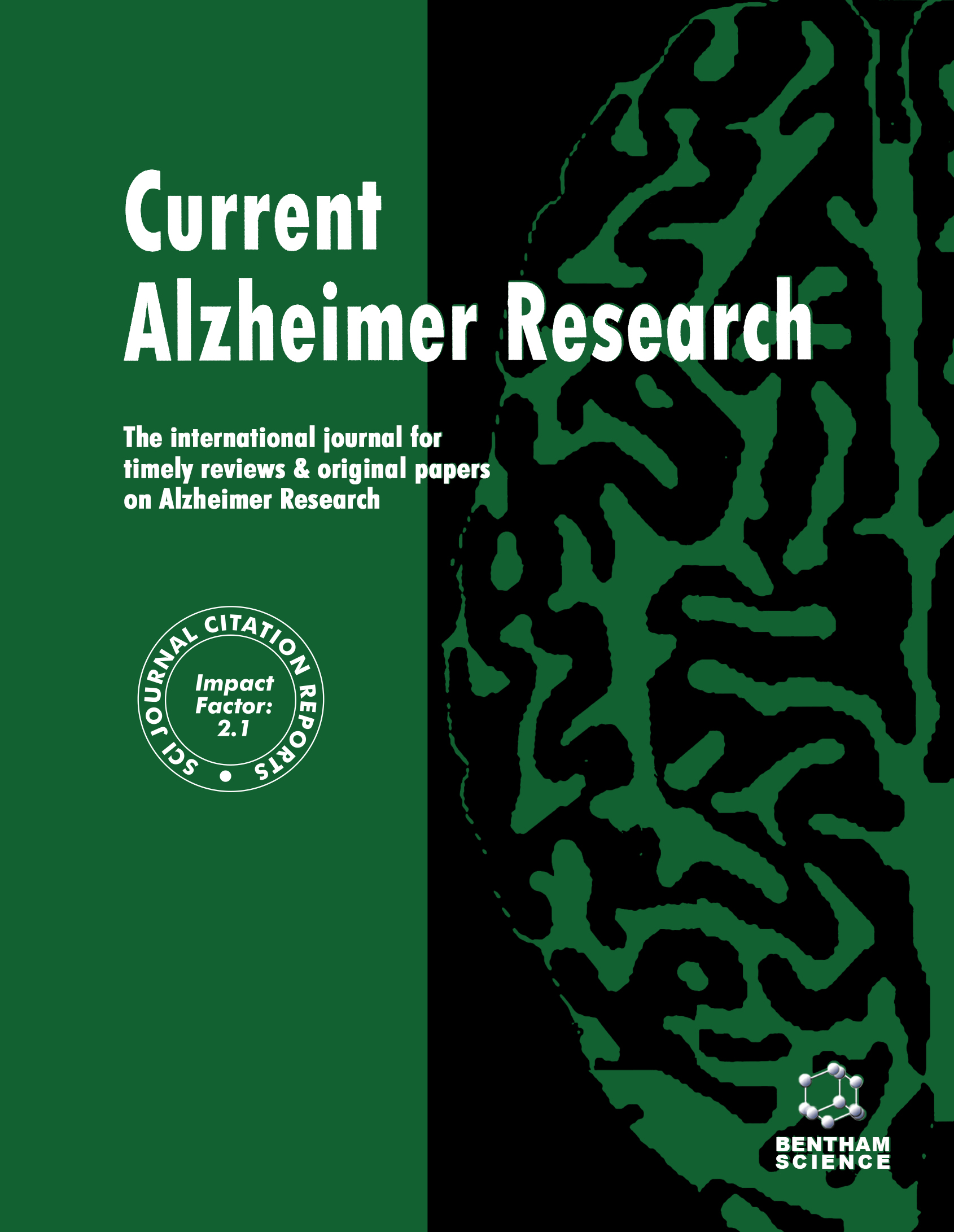- Home
- A-Z Publications
- Current Alzheimer Research
- Previous Issues
- Volume 17, Issue 5, 2020
Current Alzheimer Research - Volume 17, Issue 5, 2020
Volume 17, Issue 5, 2020
-
-
Risk Reduction and Prevention of Alzheimer's Disease: Biological Mechanisms of Diet
More LessAuthors: Hugo McGurran, Jordan Glenn, Erica Madero and Nick BottAlzheimer’s Disease (AD) incidence is increasing and with no disease modifying agents available, preventative measures through lifestyle factors are being investigated. Combined with the prevention of AD risk factors such as heart disease, diabetes, and with more recent evidence, microbiome dysfunction, there is a substantial foundation for diet as a modifiable risk factor and preventative measure for AD. Recent e Read More
-
-
-
Evaluation and Prediction of Early Alzheimer’s Disease Using a Machine Learning-based Optimized Combination-Feature Set on Gray Matter Volume and Quantitative Susceptibility Mapping
More LessAuthors: Hyug-Gi Kim, Soonchan Park, Hak Y. Rhee, Kyung M. Lee, Chang-Woo Ryu, Soo Y. Lee, Eui J. Kim, Yi Wang and Geon-Ho JahngBackground: Because Alzheimer’s Disease (AD) has very complicated pattern changes, it is difficult to evaluate it with a specific factor. Recently, novel machine learning methods have been applied to solve limitations. Objective: The objective of this study was to investigate the approach of classification and prediction methods using the Machine Learning (ML)-based Optimized Combination-Feature (OCF) set on Gray Matter Read More
-
-
-
Identification of a Pathogenic PSEN1 Ala285Val Mutation Associated with Early-Onset Alzheimer’s Disease
More LessAuthors: Van G. Vo, Jung-Min Pyun, Eva Bagyinszky, Seong S.A. An and Sang Y. KimBackground: Presenilin 1 (PSEN1) was suggested as the most common causative gene of early onset Alzheimer’s Disease (AD). Methods: Patient who presented progressive memory decline in her 40s was enrolled in this study. A broad battery of neuropsychological tests and neuroimaging was applied to make the diagnosis. Genetic tests were performed in the patient to evaluate possible mutations using whole exome sequ Read More
-
-
-
Melatonin Prevents Neddylation Dysfunction in Aβ42-Exposed SH-SY5Y Neuroblastoma Cells by Regulating the Amyloid Precursor Protein-Binding Protein 1 Pathway
More LessAuthors: Mayuri Shukla, Vorapin Chinchalongporn and Piyarat GovitrapongBackground: Amyloid Precursor Protein (APP)-Binding Protein 1 (APP-BP1) is a crucial regulator of many key signaling pathways and functions mainly as a scaffold protein to enhance molecular interactions and facilitate catalytic reactions. The interaction of APP-BP1 with Amyloid Precursor Protein (APP) plays a role in cell cycle transit control, which determines the mechanism behind the loss of cell cycle regulation in Alzhei Read More
-
-
-
Accuracy of Telephone-Based Cognitive Screening Tests: Systematic Review and Meta-Analysis
More LessAuthors: Emma Elliott, Claire Green, David J. Llewellyn and Terence J. QuinnBackground: Telephone-based cognitive assessments may be preferable to in-person testing in terms of test burden, economic and opportunity cost. Objective: We sought to determine the accuracy of telephone-based screening for the identification of dementia or Mild Cognitive Impairment (MCI). Methods: Five multidisciplinary databases were searched. Two researchers independently screened articles and extracted data. Eli Read More
-
-
-
Neuroimaging Outcomes in Studies of Cognitive Training in Mild Cognitive Impairment and Early Alzheimer’s Disease: A Systematic Review
More LessBackground: Cognitive Training (CT) has demonstrated some benefits to cognitive and psychosocial function in Mild Cognitive Impairment (MCI) and early dementia, but the certainty related to those findings remains unclear. Therefore, understanding the mechanisms by which CT improves cognitive functioning may help to understand the relationships between CT and cognitive function. The purpose of this review was to ide Read More
-
-
-
The Relationship between Social Cognition and Executive Functions in Alzheimer’s Disease: A Systematic Review
More LessIntroduction: Social Cognition (SC) is a complex construct that reflects a wide variety of implicit and explicit cognitive processes. Many neurocognitive domains are associated with SC and the Executive Function (EF) is the most representative one. We conducted a systematic review aiming at clarifying whether SC impairments are associated with dysfunction on EF in people with Alzheimer Disease (AD). Methods: The Read More
-
Volumes & issues
-
Volume 21 (2024)
-
Volume 20 (2023)
-
Volume 19 (2022)
-
Volume 18 (2021)
-
Volume 17 (2020)
-
Volume 16 (2019)
-
Volume 15 (2018)
-
Volume 14 (2017)
-
Volume 13 (2016)
-
Volume 12 (2015)
-
Volume 11 (2014)
-
Volume 10 (2013)
-
Volume 9 (2012)
-
Volume 8 (2011)
-
Volume 7 (2010)
-
Volume 6 (2009)
-
Volume 5 (2008)
-
Volume 4 (2007)
-
Volume 3 (2006)
-
Volume 2 (2005)
-
Volume 1 (2004)
Most Read This Month
Article
content/journals/car
Journal
10
5
false
en

Most Cited Most Cited RSS feed
-
-
Cognitive Reserve in Aging
Authors: A. M. Tucker and Y. Stern
-
- More Less

